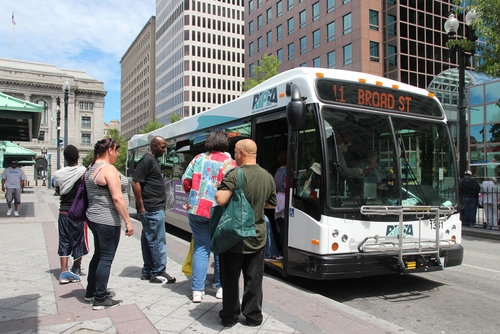
Rhode Island Gov. Gina M. Raimondo and Providence Mayor Jorge Elorza announced the state and city would be moving forward with the Providence Multi-Hub Bus System and would launch an extensive community engagement process.
The two leaders were joined by Rhode Island’s Department of Transportation (RIDOT) Director Peter Alviti and Rhode Island Public Transit Authority (RIPTA) Chief Executive Officer Scott Avedisian.
“Our Multi-Hub System, which was developed after years of stakeholder feedback and input, will be good for riders, good for the environment, and good for jobs,” Raimondo said. “With this project, we will not only improve the experience for existing riders but encourage many more Rhode Islanders to use public transportation in the years to come.”
The Multi-Hub Bus System proposal will push the state forward on its vision to create an intermodal transit network across the state. The model will connect downtown Providence south towards the innovation District and north towards the Capital Center. However, doing so will require more than one central hub.
As proposed, the Innovation hub would join the Kennedy Plaza hub and the Providence train station hub to connect riders working and living within the Providence corridor. The project includes rehabbing the historic structure at Innovation Hub and turning it into a transit center with an expansive network of transit options, including scooters and bicycles for last mile connections.
“This plan, which has evolved over six years, provides a number of very important benefits for both riders and citizens,” Alviti said. “It spreads out the heavy concentration of buses and pedestrians from a congested Kennedy Plaza to strategic satellite locations at the Innovation District, the Providence Train Station and along the edges of Kennedy Plaza. This configuration gives riders access to their jobs, educational institutions, entertainment and key intermodal transfers to major northeast metropolitan areas.”
After hiring creative company Arup to create the vision for the city’s downtown public spaces, the city will launch a public engagement process that will regularly touch-base with stakeholders and community members.
The new hubs will include restrooms, indoor waiting areas with arrival/departure boards, benches, ticket vending machines, bike racks, and bike/scooter share areas.
Funding for the project comes from a $35 million bond approved by voters in 2014.